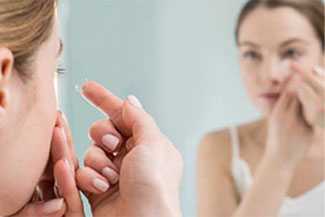
What Are Dry Eyelids?
Dry skin on your eyelids isn’t like other dry areas on your body. The sensitive skin around your eye area is much thinner and has less fat underneath it for cushioning. Another difference is that the eyelid skin is highly vasculated with blood vessels, so it’s more prone to irritation and allergic reactions than other parts of the body.
Eyelids contain tiny glands that secrete essential oils into the tears, so maintaining their health and function is vital to ocular comfort.
Treatment will depend on what’s causing your eyelids to become dry. In many cases, a dry eye optometrist can help.
Symptoms Often Related to Dry Eyelids
Eyelids that are dry are often:
- Scaly and rough
- Itchy
- Red
- Irritated
- Painful or sore
- Discolored
- Swollen
What are the Possible Causes of Dry Eyelids?
Some examples of irritants and allergens that can result in eyelid dryness are:
- Cosmetics
- Shampoos and cleansers
- Certain metals in eyelash curlers
- Food allergies
- Pollutants in the air
Medical conditions that may lead to dry eyelids include:
- Eczema
- Psoriasis
- Contact dermatitis
- Atopic dermatitis
- Blepharitis
What You Should Do If You Have Dry Eyelids
If your dry eyelids are accompanied by other symptoms, it’s best to schedule an appointment with your optometrist to rule out underlying health problems.
Mild eyelid dryness can sometimes resolve on its own after making a few lifestyle adjustments. For example, stop using makeup while your eyelids are dry, and try washing your eye area with a mild baby soap twice a day. You can also try using a humidifier while at home or work to replenish the air’s moisture.
Avoid using moisturizers or lotions around the eyes unless directed by your dermatologist or other physicians to do so. You may find relief from using warm, moist eye compresses to help soothe the irritated eyelid skin. Always wash your hands before touching your face or eyes.
If your symptoms are lingering or worsening, a visit to your local dry eye optometrist is warranted.
How a Dry Eye Optometrist Can Help
Dry eyelids are usually no cause for concern and can be treated effectively. If blepharitis (inflammation of the eyelids) is causing your eyelid dryness, we can provide safe and effective treatment options for long-lasting relief.
A thorough examination of your ocular health and medical history will help determine the root cause of your symptoms and the best treatment plan for your condition.
Whether you have dry eyelids, dry eyes or other uncomfortable ocular symptoms, we can help. To schedule a consultation, call The Dry Eye Center at My Family Eye Care today.
Our practice serves patients from Siloam Springs, Northwest Arkansas, Springdale, and Northeast Oklahoma, OK and surrounding communities.













